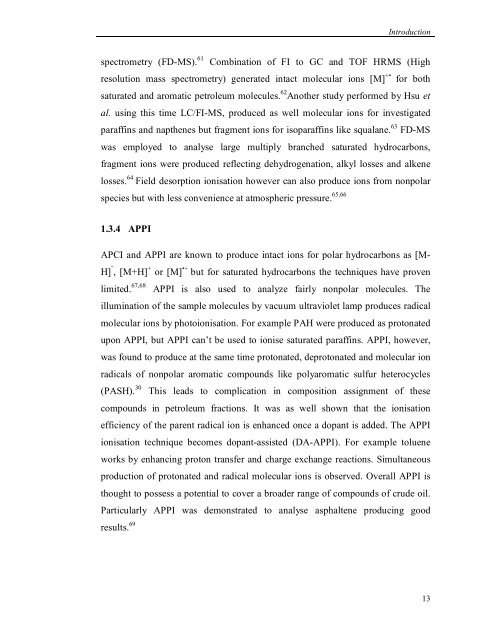Development of a Novel Mass Spectrometric ... - Jacobs University
Development of a Novel Mass Spectrometric ... - Jacobs University
Development of a Novel Mass Spectrometric ... - Jacobs University
Create successful ePaper yourself
Turn your PDF publications into a flip-book with our unique Google optimized e-Paper software.
Introduction<br />
spectrometry (FD-MS). 61 Combination <strong>of</strong> FI to GC and TOF HRMS (High<br />
resolution mass spectrometry) generated intact molecular ions [M] +• for both<br />
saturated and aromatic petroleum molecules. 62 Another study performed by Hsu et<br />
al. using this time LC/FI-MS, produced as well molecular ions for investigated<br />
paraffins and napthenes but fragment ions for isoparaffins like squalane. 63 FD-MS<br />
was employed to analyse large multiply branched saturated hydrocarbons,<br />
fragment ions were produced reflecting dehydrogenation, alkyl losses and alkene<br />
losses. 64 Field desorption ionisation however can also produce ions from nonpolar<br />
species but with less convenience at atmospheric pressure. 65,66<br />
1.3.4 APPI<br />
APCI and APPI are known to produce intact ions for polar hydrocarbons as [M-<br />
H]ˉ, [M+H] + or [M] •+ but for saturated hydrocarbons the techniques have proven<br />
limited. 67,68 APPI is also used to analyze fairly nonpolar molecules. The<br />
illumination <strong>of</strong> the sample molecules by vacuum ultraviolet lamp produces radical<br />
molecular ions by photoionisation. For example PAH were produced as protonated<br />
upon APPI, but APPI can’t be used to ionise saturated paraffins. APPI, however,<br />
was found to produce at the same time protonated, deprotonated and molecular ion<br />
radicals <strong>of</strong> nonpolar aromatic compounds like polyaromatic sulfur heterocycles<br />
(PASH). 30 This leads to complication in composition assignment <strong>of</strong> these<br />
compounds in petroleum fractions. It was as well shown that the ionisation<br />
efficiency <strong>of</strong> the parent radical ion is enhanced once a dopant is added. The APPI<br />
ionisation technique becomes dopant-assisted (DA-APPI). For example toluene<br />
works by enhancing proton transfer and charge exchange reactions. Simultaneous<br />
production <strong>of</strong> protonated and radical molecular ions is observed. Overall APPI is<br />
thought to possess a potential to cover a broader range <strong>of</strong> compounds <strong>of</strong> crude oil.<br />
Particularly APPI was demonstrated to analyse asphaltene producing good<br />
results. 69<br />
13
















